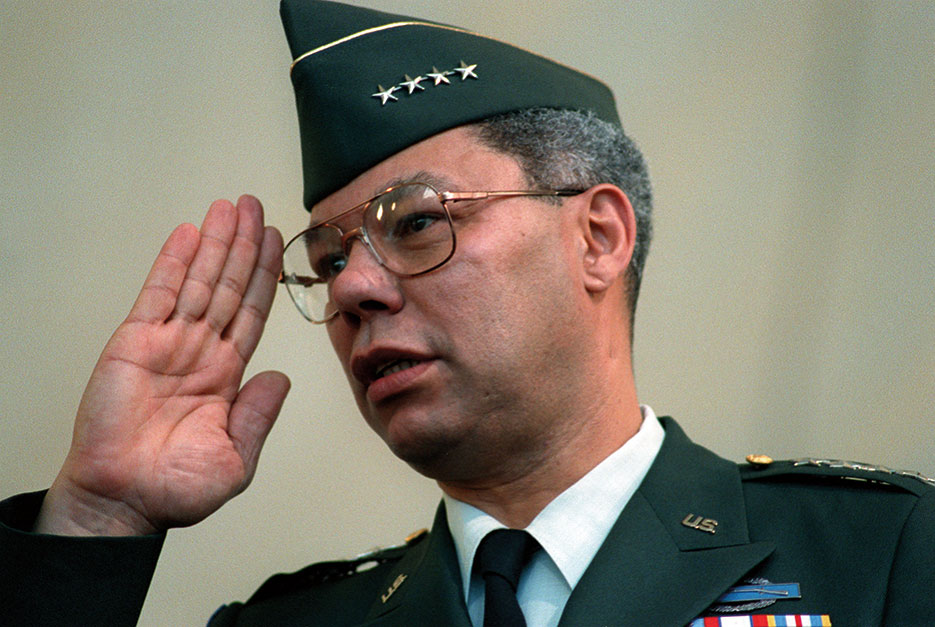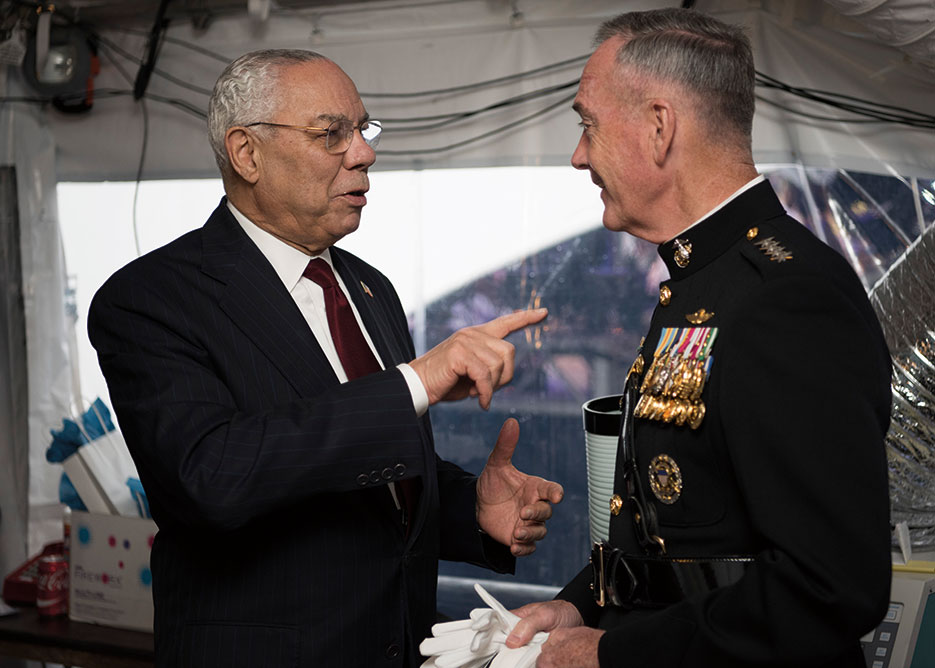Download PDF
All of us would like direct feedback on how we are performing our missions. We hope that someone would reach out to let us know our hard work is meaningful and respected. Usually, however, we continue our work without direct encouragement, hoping it will have the impact we want to achieve.

On December 7, 1991, General Powell, then Chairman of the Joint Chiefs of Staff, salutes during Sunset Ceremony for Pearl Harbor survivors at Arizona Memorial Visitors Center (DOD/Gloria Montgomery)
I am fortunate to have recently received feedback directly from the founder of Joint Force Quarterly and internationally renowned four-star general and statesman, General Colin Powell. During this surprise communication, we discussed JFQ’s history and impact, including the journal’s role in promoting jointness itself. General Powell’s comments validated my own feelings about the value of JFQ in the joint environment. He made it clear that the journal has been a great success, and it needs to continue its mission. He reiterated something I already know: the quality of our work is exceptional and the message promoting jointness is being heard. His final comments were “Job well done. Carry on the mission.”
General Powell passed on two items that are included in this issue. The first is a letter containing some additional detail about the founding of the journal—a topic that was previously covered in the JFQ 83 Executive Summary. Accompanying this letter is his note to the joint force in 1991, summarizing his views on joint warfighting.
We continue our tradition of excellence in this issue. In the Forum, the next installment in our series of interviews with senior officers features the 28th Chief of the National Guard Bureau, General Joseph L. Lengyel, USAF. He discusses the implications of gaining a seat at the table with the other joint chiefs. In his accompanying article, he elaborates on how the Guard is building on its achievements while enhancing its reputation as an operational reserve for the joint force. James M. Davitch next discusses how the wealth of unclassified data could be a valuable resource and what would be the best way to use it. Thomas Ayres provides us with a review of the law of war in cities, as some have questioned the legality of fighting in the urban environment—especially in current conflicts in which war has caused a great deal of destruction. Jeffrey Miller and Ian Corey lastly investigate how nonstate actors are able to fund their operations and suggest ways to target these activities.
JFQ next presents the winning essays from the 11th annual Secretary of Defense and 36th annual Chairman of the Joint Chiefs of Staff Essay Competitions, held here at National Defense University, in May 2017. Twenty-seven senior faculty members from 14 participating professional military education institutions served as judges to determine the best student entries among the three categories. The Secretary of Defense National Security Essay winner, Travis W. Reznik, examines the need for a new authorization of the use of military force, as the current authorization dates back to the immediate post-9/11 period. Lieutenant Colonel Benjamin Ray Ogden, USA, won the Chairman of the Joint Chiefs of Staff Strategic Research Paper competition with his discussion of significant gaps in how we develop officers in military service. Nathaniel Kahler won the Chairman’s Strategy Article competition by examining the Bashar al-Asad regime and its control of Syria in the long term. Details of next year’s competitions can be found on the NDU Press Web site under “Essay Competitions.” We look forward to another year of exceptional entries.
In Commentary, we take a look at toxic leadership, global health engagement, and the Human Terrain System program. National Defense University’s chaplain, Kenneth Williams, offers a glimpse into toxic culture in the U.S. military and suggests remedies. Adding to our robust coverage of global health engagement, Bertram C. Providence, Derek Licina, and Andrew Leiendecker discuss how we can best increase the capacity of our partner nations to deal with health issues. Brian R. Price then assesses the record of the controversial Human Terrain System program and offers recommendations on how it could be employed in future conflicts.

General Powell speaks with General Dunford before National Memorial Day Concert at West Lawn of U.S. Capitol, May 28, 2017 (DOD/Dominique A. Pineiro)
Our Features section includes three interesting pieces—one resurrects an old argument, and two tackle issues that are long overdue for discussion by the joint force. First, George C. McCarthy addresses the topic of how large our general and flag force should be by suggesting we consider proportionality over concerns of other justifications. On the command and control front, Michael G. Kamas, David W. Pope, and Ryan N. Propst, using U.S. Africa Command as an example, explore options to reorganize the internal workings of the combatant commands offered in the 2017 National Defense Authorization Act. Audrey M. Schaffer discusses how norms can shape our views of protection and defense above our atmosphere as the military begins to consider the idea of an independent space force here on Earth.
Our Recall section boasts another great mixture of thought and history by our long-time contributor Phillip S. Meilinger, who offers us the opportunity to consider the impact of timing in war.
Accompanying three book reviews, our Joint Doctrine section comprises three important issues: robots, food security, and joint planning. In many popular movies and defense writings, we are warned that robots could potentially take over the practice of warfighting, a subject Jules Hurst will help us understand better as we seek doctrine to guide us on this topic. George E. Katsos discusses how the U.S. Government deals with food security as it relates to campaign planning. For many JFQ readers, the arrival of a revised Joint Publication such as the JP 5-0, Joint Planning, is a much-anticipated event. Steve Townsend provides us with important updates to the joint planners “bible.” As always, we round out the issue with the latest Joint Doctrine Update.
In the fall of 2018, we will observe the 25th anniversary of the inaugural edition of Joint Force Quarterly. We would like to extend an invitation to all the friends of the journal. Watch this space and our Web site for details as we develop this event celebrating “the lively interplay among some of the finest minds committed to the profession of arms,” as General Powell stated. In the meantime, keep thinking about the joint force, and write to us with your best ideas. JFQ
William T. Eliason
Editor in Chief